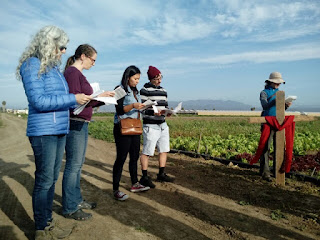Leslie Marmon Silko
Chumash Land. Ventura River Watershed. Ojai, CA.
One of the key emphases of this short residency with our sending organization (Bartimaeus Cooperative Ministries) is the opportunity it affords us to study and experiment at one of the epicenters of the "watershed discipleship" movement. Ched Myers, the co-director of BCM, says that this isn't just "tree-hugger discipleship," but an apocalypse, the unveiling of a dire situation that demands a response ("response-ability") from people of faith and conscience. It doesn't matter how much the U.S. President denies it, we are in the midst of a crisis of climate chaos and catastrophe.
Ched proposes that the start of global healing is rooted in a radical (Latin for "root") commitment to our watershed, a "region governed by Nature, not legislature." Thus Watershed Discipleship: an intentional double-entendre referring to this watershed moment (a crisis of global proportions) and a dignified and disciplined movement centered on the oldest way of understanding place: the watershed. This Moment requires a Movement.
As it turns out, when we reject political borders created by Empire, we can better examine the spiritually and physically sustainable ways of the indigenous who have always relied on their local Source of water for their survival & well-being. No water, no life. Yet our creeks are being drained and/or polluted while corporate media outlets obsess over celebrity meltdowns, stock market shakedowns and Presidential tax return takedowns.
Elaine Enns, also a co-director of BCM, brilliantly uses her experience and research in victim-offender analysis to engage with the exploitation of the Earth and her native children. The healing and reconciliation of this primal offense begins with the humble acknowledgement that we are all indicted, especially the Church which has blessed the extraction of precious resources, the exploitation of "the least of these," and the forced conversion of indigenous peoples. The rape and pillage of the Land and her people (for profit) is a multi-faceted offense that is coming back to haunt humanity, echoing the cry of the 12th century German mystic Hildegard of Bingen:
All of creation God gives to humankind to use. If this privilege is misused, God’s justice permits creation to punish humanity.
Or, from the late Japanese farmer-philosopher Masanobu Fukuoka:
If we throw Mother Nature out the window, she comes back in the door with a pitchfork.
Watershed discipleship is a network of alternative Christian communities committed to Something bigger than big buildings and butts in the seats. These communities pledge allegiance to the fierce energy of indigenous people which always comes from a struggle for something: a place (for the latest example of this five-hundred-year tradition, just google "Standing Rock")! Watershed discipleship communities primarily ask questions in the positive:
What am I struggling for?
What am I saying "Yes" to?
What would I be willing to die for?
This prompts us all to ask very basic questions about our watershed:
-What time is sunset today?
-When you flush, where do the solids go? What happens to the waste water?
-Can we name five native edible plants in our watershed?
-Where does our garbage go?
-Who uses the paper/plastic we recycle from our neighborhood?
-Can we name five birds that live in our watershed?
-After the rain runs off our roof, where does it go?
These questions lead to answers that lead to more questions that lead to a deeper knowledge and love for place.
Watershed discipleship communities reject apathy, indifference, resignation and cynicism. It is a commitment to looking out for what is the very best for everyone and every living thing: from the homeless to the halibut, from gardens to grandmas.
We've come upon a watershed moment. The curse of civilization plagues us. As Dr. King lamented exactly fifty years ago next week (April 4, 1967), we continue to live in a situation where "machines and computers, profit motives and property rights are considered more important than people." We need a conversion of the imagination! It starts with our watershed.
Photos below (from top to bottom): Lindsay works the Ojai farmers market on a Sunday morning with Sarah Nolan, the director of the Abundant Table Farm Project; a Sunday afternoon Farm Church gathering, a stone's throw from the Ventura River; a "stations of the cross" Sunday service in solidarity with all our immigrant neighbors at the Abundant Table Farm in Camarillo; Lindsay shoveling wood chips during one of our Friday afternoon garden sessions in the backyard of Ched and Elaine's home (affectionately called "Casa Anna Schultz," it is a demonstration plot for foods and plants native to this watershed).








No comments:
Post a Comment